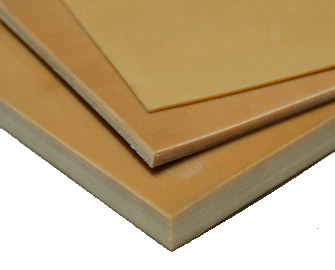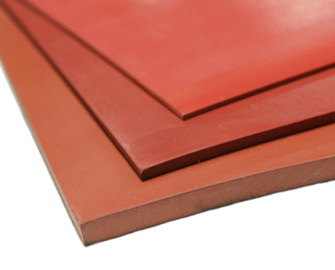|
|
The softest silicone is offered in a 40A durometer solid silicone sheet is a popular material used for industrial and residential applications. Soft silicone rubber is a resilient material that is often used for applications that are too harsh for other rubber variations, such as natural rubber. A flexible silicone sheet is offered in multiple durometers, or hardness, with the 40A durometer solid silicone sheet being the softest and most pliable. 40A silicone gauges are also a major factor in the flexibility and pliability of the material and is available in 7 different gauge thicknesses. 40A soft silicone rubber is commonly used in highly compressive applications due to its soft and pliable nature.
Is Silicone Softer than Rubber?
Silicone is softer than rubber and retains a lower tensile strength, but soft silicone rubber can last longer in extreme high and low temperatures and damaging environmental factors. Soft silicone rubber generally has a lower tensile strength and low wear and tear strength than rubber. Despite this, soft silicone rubber does still maintain a good level of tensile strength and abrasion resistance. Although silicone is softer than rubber, it will retain better properties when exposed to extreme high and low temperatures. For instance, “Some properties such as elongation, creep, cyclic flexing, tear strength, compression set, dielectric strength (at high voltage), thermal conductivity, fire resistance, and in some cases tensile strength can be – at extreme temperatures – far superior to organic rubbers in general…” (Wikipedia.org). Soft silicone rubber can stay flexible in temperatures as low as -103 degrees Fahrenheit without becoming susceptible to embrittlement which is the hardening of rubber when exposed to low temperatures that causes the material to lose their ductility and flexibility. Rubber is highly susceptible to damage cause by embrittlement and will eventually crack or fail when exposed to low temperatures. Additionally, in high temperatures of up to +500 degrees Fahrenheit, soft silicone rubber will not melt and will remain reliable in an application while rubber will melt or burn in high temperatures. Although it retains a lower tensile strength, soft silicone rubber is able to remain resilient in harsher environments and factors than rubber.

|

|
-
(a) What is the Softest Silicone?
The softest silicone is a 40A durometer flexible silicone sheet due to its low durometer hardness rating. Solid silicone is offered in 40A, 50A, 60A, and 70A durometer ratings with the material getting harder as the durometer rating gets higher. Durometer is “a standardized way to measure the hardness of materials like rubber (elastomers) and plastics” (industrialspec.com). As the durometer rating rises, the harder and stiffer the material will become which also makes them less flexible. Case in point, 40A durometer soft silicone rubber sheet will be significantly softer than a 70A solid silicone sheet. The hardness of the flexible silicone sheet is also affected by the silicone gauges. 40A soft silicone rubber sheets are offered in various gauges including 1/32", 1/16", 3/32", 1/8", 3/16", 1/4", and 3/8". The silicone gauges and durometer are two of the main factors of flexible silicone sheet that dictate its pliability and compressibility. 40A soft silicone rubber is often used for compressive applications as its softer nature and thinner silicone gauges allow for better compressibility.

|

|
(b) Is Silicone the Same Thing as Rubber?
Silicone, like rubber, is an elastomer, but it is not the same thing as rubber because silicone is considered an inorganic polymer whereas rubber is considered an organic polymer. The main difference between these two materials is their polymer backbone structures. Organic polymers have a carbon-to-carbon bonded backbone structure; however, because silicone is an inorganic polymer, it has a silicon-to-oxygen bonded backbone structure. Soft silicone rubber is an elastomer and is a flexible material, making it an excellent elastomer. For instance, “The bonds between silicon atom and the two oxygen atoms attached to it are very flexible. The angle formed by these bonds can open and close like scissors without much trouble. This makes the whole backbone chain flexible” (pslc.ws). The difference in polymer backbone bonded structures gives soft silicone rubber superior thermal stability and environmental resistance properties.
Is Silicone Stronger than Rubber?
Silicone is stronger than rubber due to its superior thermal stability and resistance to outdoor environmental factors. Rubber generally retains a higher tensile strength than soft silicone rubber, but silicone is able to remain functional in harsher conditions. Due to its inorganic silicon-to-oxygen polymer backbone structure, silicone rubber has enhanced properties compared to those of natural rubbers. Case in point, “Compared to organic rubber, silicone rubber has Si-O bond in its structure, and hence, it has better: heat resistance, chemical stability, electrical insulation, abrasion resistance, and weatherability as well as ozone resistance” (omnexus.specialchem.com). Soft silicone rubber is best known for its wide operating temperature range with an operating temperature range of -103 to +500 degrees Fahrenheit. This operating temperature range allows rubber parts, such as an industrial black silicone gasket, to remain functional in settings exposed to extreme temperatures. In addition, at low temperatures, an industrial black silicone gasket is also will not be affected by embrittlement and will remain intact in extremely high temperatures. Although rubber may hold a slightly higher tensile strength than silicone rubber, but silicone can remain flexible and functional in extreme temperatures. Furthermore, its excellent resistance to damaging outdoor factors, such as UV rays, ozone, oxygen, and moisture, making silicone rubber a versatile material that can be used in both indoor and outdoor settings.
-
(a) What Things are Made of Silicone?
A wide range of things are made of silicone such as industrial silicone gaskets, seals, and rubber parts for industrial applications as well as parts for applications that may involve materials intended for human consumption. Solid silicone sheets are one of the most popular materials used to create industrial rubber parts intended for abrasive environments. For instance, “Silicone rubber is a perfect choice of material in applications requiring: 1) for applications exceeding working temperature above 100C [212F], 2) non-toxic food contact applications, 3) high electrical resistance, 4) high steam sterilization resistance especially in seals & gaskets used in medical devices, and 5) high durability” (omnexus.specialchem.com). Industrial silicone rubber parts, such as black silicone gaskets and seals, are highly resistant to extremely high and low temperatures, caustic chemicals, and damaging outdoor factors, allowing them to be used in both indoor and outdoor industrial applications. Black silicone gasket and seal are ideal for industrial use because silicone is able to operate in both high and low temperatures and resist damage caused by caustic chemicals. Not only does a flexible silicone sheet make an excellent industrial material, but it also makes an excellent versatile indoor/outdoor material that may be used in residential applications, such as weatherstripping on doors and windows.

|

|
Soft silicone rubber is a durable and pliable material that is a popular material used in industrial and residential settings. 40A durometer solid silicone is a flexible and pliable material that is ideal for compressive applications. A 40A flexible silicone sheet is commonly used in industrial applications, such as a black silicone gasket and seal. Although it is a softer variation of silicone, 40A flexible silicone sheet is thermally stable and is highly resistant to damaging outdoor factors, including UV rays, ozone, oxygen, and moisture, making it a versatile and durable material. Overall, soft silicone rubber can offer a resilient and safe application in both indoor and outdoor settings.
What is the Softest Silicone?
|
|
|